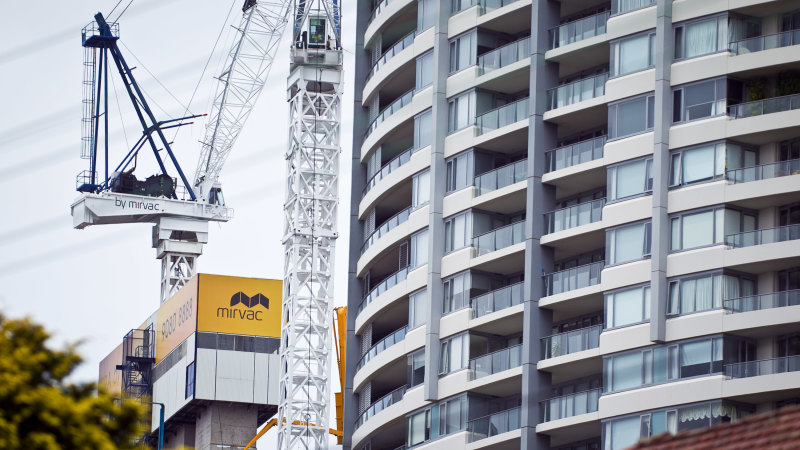Save articles for later
Add articles to your saved list and come back to them any time.
Australia’s building industry is fractured over plans to end the use of engineered stone as major developers Lendlease and Mirvac, in opposition to the housing lobby, back a national ban.
As state and territory ministers flesh out a plan to prohibit the substance riddling stonemasons with irreversible lung conditions, advice from a top workplace lawyer warns that employers who continue to use engineered stone after a major report called for the ban are probably breaking the law.
Mirvac is one of the major developers supporting a ban on engineered stone.Credit: Bloomberg
Construction, Forestry and Maritime Employees’ Union national secretary Zach Smith last week announced that Mirvac, Lendlease and construction group John Holland had joined retailers Bunnings, Ikea and Mitre10 in supporting a ban.
A Lendlease spokesperson said on Monday the developer “will no longer procure or use engineered stone for new development projects within our Australian operations”.
“We’re currently reviewing the use of engineered stone in the other countries in which we operate,” the spokesperson said.
A Mirvac spokesperson said the company supported the stance of the CFMEU, “alongside other major builders, retailers and the vast majority of state governments”.
In an email to its members, the Housing Industry Association said that while it recommended its members explore alternative products, they could continue to use engineered stone and offer it to their clients.
“HIA and members are very concerned with the recommendation and the impact a ban would have not only on their business and the residential building industry, but consumers and the broader construction industry,” managing director Jocelyn Martin said in the November 24 email.
A HIA spokesperson said that in the event of a ban the organisation was calling for adequate industry consultation around phasing out its use.
All state and territory workplace safety ministers have backed a blanket ban of engineered stone following the release of Safe Work Australia’s October report, which said there was no level of crystalline silica safe for tradies in cutting the kitchen benchtop slabs.
The report was commissioned after an investigation by this masthead and 60 Minutes this year revealed a growing number of workers were battling the debilitating symptoms of silicosis while state-based regulators failed to guard against the dangers associated with inhaling crystalline silica dust.
Federal Workplace Relations Minister Tony Burke is holding a meeting with state and territory colleagues on Wednesday, when a plan on blanket prohibition is expected to be worked out, including a timeline to end its use. A potential import ban is also expected to be discussed.
In advice prepared for the CFMEU, veteran silk John Agius, KC, and barrister Philip Boncardo said there was “a distinct possibility and indeed a likelihood” that employers who continued to expose workers to cutting engineered stone were breaching health and safety laws.
“Given that breathing in respirable crystalline silica presents a risk of death or serious illness, it is also our view that there is a distinct possibility, and indeed a likelihood, that an employer … that continues to use engineered stone and exposes workers and other persons to respirable crystalline silica will commit an offence,” the advice says.
“There may also be potential liability for … employers for industrial manslaughter where a worker or other person dies after being exposed.”
CFMEU secretary Zach Smith said the legal advice “should send chills down the spines of employers who continue to work with deadly engineered stone”.
“We knew using a product that kills as many as one in four workers who come into contact with it was immoral,” he said. “Now it’s clear that it’s also illegal.”
Cut through the noise of federal politics with news, views and expert analysis from Jacqueline Maley. Subscribers can sign up to our weekly Inside Politics newsletter here.
Most Viewed in Politics
From our partners
Source: Read Full Article


